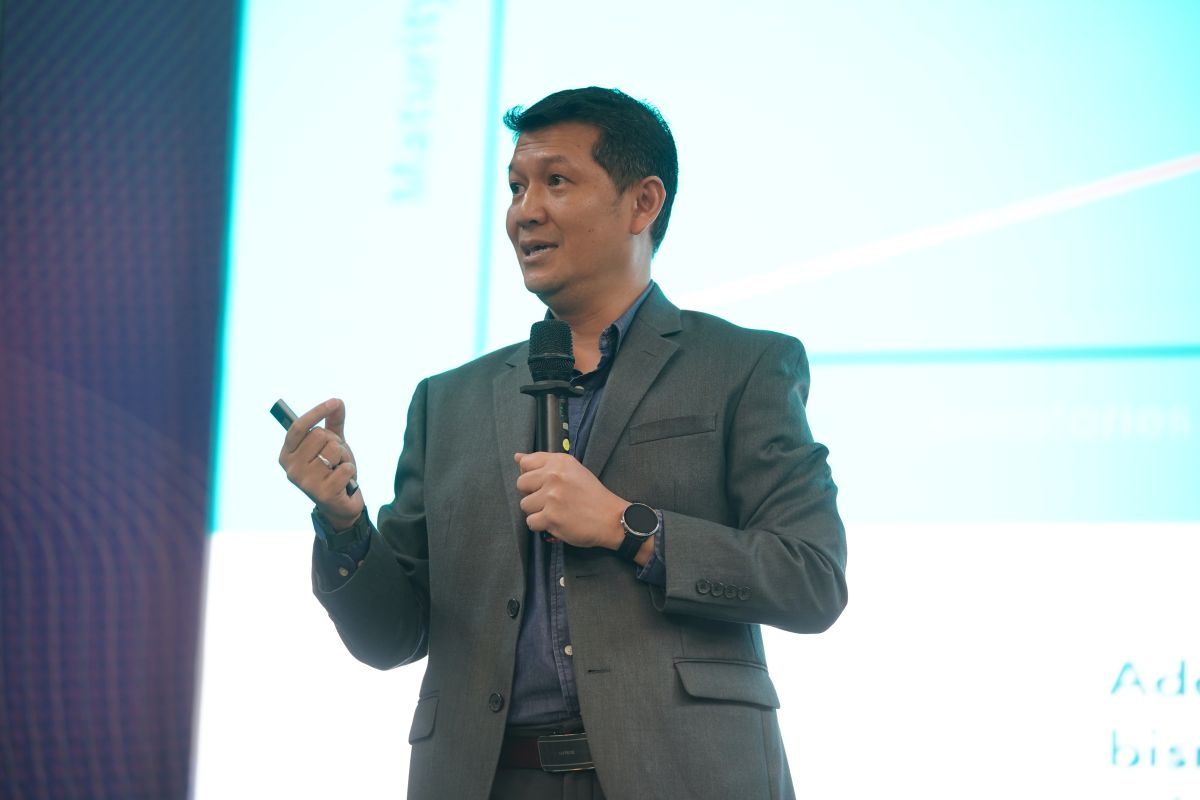An ITB Lecturer Makes Development on Natural Language Processing
By Adi Permana
Editor Adi Permana

*Dr. Eng. Ayu Purwarianti, S.T., M.T. (Photo by: Adi Permana/PR of ITB)
BANDUNG, itb.ac.id – Human as social beings do one basic activity. We communicate, both verbally or nonverbally. Internet has made communication easier so that we can receive information or news fast.
One of technological development in linguistics is Natural Language Processing (NLP). The knowledge is applied to several familiar application such as search engine, virtual assistance, and online machine translation.
NLP is a part of artificial intelligence. It is multidiscipline, between computer science and linguistics. One of lecturers at Informatics Study Program in School of Electrical Engineering and Informatics of ITB (STEI) who delves into NLP in Indonesian language is Dr. Eng. Ayu Purwarianti, S.T., M.T. According to Ayu, NLP is an artificial intelligence science that process human language.
“The target is to make a compter that understands human language. One example of NLP that we frequently use is search engine. We do searching using search engine. We input the keywords so that the search engine will find documents relevant to the keywords we input. NLP is developed rapidly because of two things, the abundance of data on the internet and human’s wish to easily and simply use technology, or usually called user friendly,” she said.
Ayu has developed NLP in Indonesian language since 1998 during her undergraduate study. she continue the study with development on cross-language question answering in Japanese and English during her doctoral study in Japan. She explained that cross-language question answering is an automatic answer search system where user’s questions and document batch of the answer source are written in different language.
There are several basic tools in NLP that need prior development in order to receive other accurate NLP processing module such as sentence splitter which cuts paragraph into sentences, tokenization which cuts sentences into compounds.
“After it divides into words, the next tools is syntax analysis. This analysis is categorized into several word types such as adjectives, nouns, verbs, etc. the analysis also results in word tree that show structural connection between words in a sentence. After that, the classified words should form a meaning when joined with one another. The tool is also called as semantic analysis,” she explained.
There are two general approaches in NLP, machine learning based and rule based. On a rule based approach, all processing rules in NLP module is determined manually by human while on machine learning based, human only give inputs such as training data as learning source for machine to obtain language processing pattern. “Most NLP that I develop are machine learning based, which have advantages over rule based in its ability to automatically handle new words or words that did not emerge on data training, so that when unfamiliar words to the machine appear, the system will automatically guess the result based on the pattern learned during data training,” said Ayu who is also the Head of Doctoral Program in Electrical Engineering and Informatics of STEI ITB.
Development of NLP is useful for various aspects of human lives. Other examples besides search engine is machine translation such as Google Translate or virtual assistant such as Siri. In addition, NLP is useful in academic to detect plagiarism. “So actually in our daily lives, we frequently interact with NLP,” Ayu said.
One of NLP application that is currently developed by Ayu is sentiment analysis which understand opinions swarming on the internet so that we can see what is discussed by social media users. Businessmen have invited Ayu to develop sentiment analysis that relates to their businesses.
“In the practice, businessmen need to know about people’s sentiment on their companies. This relates to the reputation of the company which affect public’s or investors’ views,” Ayu explained.
Besides sentiment analysis, Au also cooperate with companies for Hoax classifier that checks if information spread on messenger are hoax or not.
Amidst his tight schedule as a lecturer, Ayu do a NLP development on chatbot. Chatbot is a computer program designed to simulate chats between inquirers and computers. Chatbot makes it possible for companies to answer customer inquiries 24 hours. The answer to customers’ questions can even be learned automatically by the system from documents and not only from scenarios written by chatbot designer.
“So that the company can input a document to improve the chatbot’s knowledge. In addition, chatot is hybrid by involving human agent for new questions that the chatbot have never learned of, and the result of question and answer between human agent and customers can next be inputted as new knowledge for the chatbot automatically. This will make it easier for companies to open 24 hours service,” she said.
Reporter: Billy Akbar Prabowo (Metallurgical Engineering 2016)


.jpg)

.jpg)



